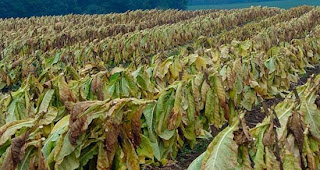
Tobacco farmers in three Ilocos Region provinces and in Abra of the Cordillera Administrative Region recently agreed to ask the National Tobacco Administration (NTA) to raise the price of tobacco leaves to P128 per kilo of unclassified leaves.
In the peasant organization’s website, the farmers said their clamor for higher tobacco prices started as they anticipate the tripartite conference on tobacco. Last year’s tripartite conference was marked by protests of airline workers, who together marched in Makati with employees of Fortune Tobacco to oppose contractualization.
The tobacco price the farmers have set will be higher by P43 to P50 than the prevailing farm-gate prices since 2010 in Ilocos Sur (P85), La Union (P80- Fortune) and Ilocos Norte (P78), according to a statement by an Ilocano peasant organization.
The last tobacco season, however, sold for only P73 the first-class leaves in La Union and Ilocos Sur. It was much lower in Abra (P70) and Ilocos Norte (P68).
Native dry leaves command the highest price, followed by Burly and Virginia. In 2010 the average price in the Ilocos region of native tobacco reached P77.42, Burley at P71.46 and Virginia at P46.44.
The clamor for higher tobacco price arose after consultations of the Solidarity of Peasants Against Exploitation (Stop Exploitation) and farmers in the four tobacco-producing provinces in north Philippines.
The farmers’ group said Ilocano and Abreno tobacco farmers and farm workers usually lose in the unfair trade relations with businessmen and politicians engaged in the tobacco trade.
“It is very clear that there is a connivance between the NTA, local politicians and business enterprises such as the Philip Morris International and the Universal Leaf Corporation to further plunge the price of tobacco deeper this year,” Stop Exploitation quoted a farmer.
The farmers said, “Government agencies and local government units offered no help despite getting millions out of RA7171 and RA 8240.”
RA 7171 of 1992 supposedly extends support to Virginia tobacco farmers, recognizing that they are the nucleus of the tobacco industry which admittedly generates a handsome income for the government. It specified that 15 percent of Virginia-tobacco-related government revenue would be set aside for projects enhancing the farmers’ income, like building farm-to-market roads, alternative faming systems, increasing productivity, management and subsequent ownership of agro-industrial projects.
RA 8240 is the Comprehensive Tax Reform Law which changed from ad valorem to specific taxes those excised from tobacco manufacturing.
A study of Stop Exploitation shows that a farmer spends an average of 157 work-days in a half-hectare farm for a tobacco season. Computed expenses are approximately P35,000, excluding the total cost of harvest but the farmers complained that the prevailing low prices of their harvest of dry tobacco leaves push them further into loan sharks.
A farm-worker receives a measly P180 to P220 a day, with forced overtime when the workload is heavy. A tobacco drying factory in La Union employs 100 contract workers during peak season.
The contract-growers are not far behind. Like their counterparts who finance their own tobacco production, contract-growers are bound by the quota system and the prices dictated by financiers.
“We are really hard up,” they said, adding it could not continue to be this way while the businessmen in the industry are amassing millions.
In 2009, the Bureau of Agricultural Statistics (BAS) of the Department of Agriculture estimated the tobacco production at P3 billion, higher than tomato (P2.4 billion) and garlic (P800 million).
Philip Morris Philippines and Fortune Tobacco Corporation agreed to put up the Philip Morris Fortune Tobacco Corporation (PMFTC), with Philip Morris reportedly acquiring 51-percent of the original FTC shares, leaving the remaining 49-percent to Lucio Tan, who also controls Asia Brewery, Philippine Airlines, Philippine National Bank and many other corporations.

Комментариев нет:
Отправить комментарий